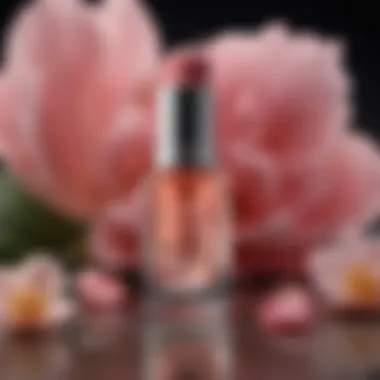Unlocking the Connection: Hormonal Fluctuations and Vulva Acne Impact


Fashion Trends & Style Guides
Beauty & Wellness
Exploring the realm of beauty and wellness offers a holistic approach to understanding the effects of hormonal fluctuations on vulva acne. Delving into skincare routine tips tailored specifically for addressing hormone-related acne on the vulva can provide valuable insights for women of all ages. By uncovering the secrets to maintaining optimal skin health through proper hair care and makeup techniques, individuals can effectively manage vulva acne induced by hormonal changes. Makeup tutorials can offer practical guidance on concealing acne flare-ups while promoting skin health and overall well-being.
Pop Culture & Entertainment
In the realm of pop culture and entertainment, discussions surrounding skincare and beauty often intertwine with themes of self-care and confidence. Keeping abreast of celebrity news and updates can shed light on how public figures navigate hormonal acne, including vulva acne. By reviewing movie and TV show reviews, individuals can glean information on how on-screen personalities address skin concerns, contributing to the discourse on hormonal changes and acne. Music and concert highlights may offer stress-relief tips that can indirectly impact hormonal balance and, consequently, vulva acne.
Parenting Tips & Advice
Though seemingly unrelated, parenting tips and advice can indirectly influence the management of hormonal vulva acne. For expecting mothers, pregnancy guides may illuminate how hormonal shifts during gestation can impact skin health, potentially leading to acne flare-ups. Newborn care tips may inadvertently touch on maternal well-being, highlighting the importance of self-care amidst hormonal changes that could manifest as acne issues. Insights on child development provide a broader perspective on hormone-related skin conditions, fostering a proactive approach to addressing vulva acne in women throughout different life stages.
Politics & Social Commentary
Considering the broader spectrum of political and social commentaries, discussions around women's health and well-being are gaining momentum. Recent political events may spark conversations on access to dermatological care for hormone-induced acne, including vulva acne. Features on women in leadership can shed light on navigating professional settings while dealing with hormonal skin issues, emphasizing the significance of self-care. Policy analysis on healthcare initiatives may touch on dermatological services catered to addressing vulva acne, underscoring the importance of well-informed decisions regarding hormonal imbalances and skin health.
Understanding Hormonal Vulva Acne
Understanding Hormonal Vulva Acne is a crucial aspect of this article as it sheds light on the intricate relationship between hormonal fluctuations and the development of acne on the vulva. By delving into this topic, readers can gain valuable insights into the underlying mechanisms that govern vulva acne formation, common triggers that exacerbate this condition, and effective strategies for its management. Exploring the impact of hormonal changes on vulva health is essential for individuals seeking to address this specific skincare concern with a holistic approach.
Introduction to Vulva Acne
Defining Vulva Acne:
Unpacking the concept of Vulva Acne is fundamental to understanding the complexities of this dermatological issue. By defining Vulva Acne, we outline the specific characteristics of acne that manifest on the vulva region, highlighting the importance of differentiating it from facial or body acne. This distinction is crucial as Vulva Acne requires tailored treatment and care due to the sensitive nature of the area. Understanding the unique features of Vulva Acne equips individuals with the knowledge needed to address this condition effectively within the scope of this article.
An Overview of its Prevalence:
Examining the prevalence of Vulva Acne provides valuable context regarding the frequency of this condition among the population. By gaining insights into the prevalence rates of Vulva Acne, readers can grasp the significance of this issue within the realm of dermatology. Understanding the prevalence of Vulva Acne sets the stage for a thorough exploration of its impact on individuals' overall well-being. Unpacking this aspect paves the way for a more nuanced discussion of the strategies needed to manage and alleviate the symptoms of Vulva Acne effectively.
Role of Hormones


Impact of Hormonal Changes on Skin Health:
Analyzing the impact of hormonal changes on skin health offers a comprehensive view of how hormonal fluctuations contribute to dermatological conditions such as Vulva Acne. By elucidating the direct influence of hormones on skin health, we underscore the significance of hormonal balance in preventing and managing acne outbreaks. Recognizing the profound effects of hormonal changes on skin health is essential for devising targeted interventions to mitigate the symptoms of Vulva Acne effectively.
Specific Hormones Linked to Vulva Acne:
Identifying the specific hormones linked to Vulva Acne is a key focus of this section as it elucidates the hormonal imbalances that drive acne development in the vulva area. By pinpointing the hormones directly associated with Vulva Acne, readers can comprehend the underlying physiological processes that contribute to this dermatological issue. Exploring the relationship between specific hormones and Vulva Acne facilitates a deeper understanding of the interplay between hormonal fluctuations and skin health, offering insights that can inform tailored treatment approaches within the scope of this article.
Factors Influencing Hormonal Vulva Acne
In delving into the complexities of Hormonal Vulva Acne, one cannot ignore the pivotal role played by various factors. Understanding these factors is essential in comprehending the triggers and management of such a condition. Factors influencing Hormonal Vulva Acne encompass dietary habits, stress levels, and external elements, all of which can significantly impact the skin's health and hormonal balance.
Dietary Habits and Hormonal Balance
Effects of Sugar and Dairy on Acne
Exploring the Effects of Sugar and Dairy on Acne reveals a crucial link between dietary choices and skin health. Sugar and dairy consumption have been associated with increased acne prevalence due to their potential to disrupt hormonal balance. Excessive sugar intake can spike insulin levels, leading to inflammation and acne breakouts. Similarly, dairy products contain hormones and growth factors that may exacerbate hormonal imbalances, contributing to skin issues. While sugar and dairy may be tasty indulgences, moderation is key to maintaining hormonal equilibrium for healthy skin.
Role of Nutrient Deficiencies
The Role of Nutrient Deficiencies sheds light on the importance of a well-rounded diet in supporting hormonal balance and skin health. Deficiencies in essential vitamins and minerals can compromise skin integrity and exacerbate acne symptoms. Key nutrients like Vitamin A, Vitamin E, and Zinc play vital roles in regulating hormonal activity and promoting skin rejuvenation. Incorporating nutrient-rich foods and supplements can help address deficiencies and support a clear, glowing complexion. Balancing dietary choices with adequate nutrients is crucial in managing hormonal vulva acne effectively.
Stress and Hormonal Imbalance
Impact of Stress on Hormones
Examining the Impact of Stress on Hormones underscores the intricate connection between psychological well-being and skin health. Prolonged stress can trigger hormonal imbalances by elevating cortisol levels, leading to increased sebum production and clogged pores. This cascade of events can fuel acne development, particularly on sensitive areas like the vulva. Implementing stress-reducing techniques and lifestyle modifications is paramount in restoring hormonal equilibrium and preventing acne flare-ups.
Stress Management Techniques for Acne
Addressing Stress Management Techniques for Acne introduces proactive strategies to mitigate the effects of stress on skin. Practices such as mindfulness, exercise, and adequate rest can help regulate cortisol levels and promote hormonal balance. Furthermore, incorporating self-care rituals and seeking professional support can enhance stress resilience and bolster skin resilience against hormonal fluctuations. By prioritizing stress management, individuals can cultivate a harmonious internal environment conducive to healthy skin.
External Factors and Acne Development


Environmental Triggers
Exploring Environmental Triggers uncovers the influence of external factors on vulva acne development. Environmental pollutants, allergens, and harsh skincare products can compromise the skin's barrier function and trigger inflammatory responses. Awareness of environmental triggers is key in minimizing exposure and safeguarding skin health. Opting for gentle, non-toxic skincare formulations and adhering to a holistic skincare routine can mitigate the impact of environmental stressors, fostering a balanced and resilient complexion.
Skincare Products and Vulva Acne
Discussing Skincare Products and Vulva Acne highlights the significance of product selection in managing hormonal skin concerns. Choosing suitable skincare products tailored to the vulva's delicate skin barrier is essential in preventing irritation and inflammation. Non-comedogenic, fragrance-free, and hypoallergenic formulations are recommended to reduce the risk of acne onset and maintain skin integrity. By prioritizing skin-friendly products and mindful ingredient selection, individuals can nurture a supportive skincare regimen that aligns with their hormonal needs.
Managing Hormonal Vulva Acne
In this insightful article on 'Managing Hormonal Vulva Acne,' we delve into the critical aspects of controlling acne associated with hormonal fluctuations specifically in the vulva region. Understanding and addressing this issue is paramount for individuals looking to enhance their skin health and overall well-being. By focusing on managing hormonal vulva acne, we aim to provide practical solutions and effective strategies to mitigate this common skin concern.
Skincare Regimen for Vulva Acne
Gentle Cleansing Practices
Discussing the significance of 'Gentle Cleansing Practices' within the realm of skincare for vulva acne sheds light on the meticulous care required for sensitive skin areas. Implementing gentle cleansing not only ensures thorough cleaning but also minimizes irritation and inflammation. The key characteristic of gentle cleansing practices lies in their ability to cleanse without stripping the skin of essential moisture, making them a popular choice among individuals combating vulva acne. The unique feature of gentle cleansing practices is their mild yet effective formula, which offers a soothing cleanse while being gentle on delicate skin, thus reducing the risk of exacerbating acne.
Choosing Suitable Products
When it comes to 'Choosing Suitable Products' for vulva acne care, the emphasis is on selecting formulations that are gentle, non-comedogenic, and free of harsh chemicals. Suitable products play a crucial role in maintaining skin balance and preventing flare-ups. The key characteristic of these products is their compatibility with sensitive skin, making them a beneficial choice for individuals dealing with vulva acne. The unique aspect of suitable products is their targeted formulation designed to address acne concerns without causing further irritation, offering advantages such as gentle yet effective acne management.
Nutritional Intervention
Balanced Diet for Hormonal Balance
Exploring the impact of a 'Balanced Diet for Hormonal Balance' on skin health reveals the profound influence of nutrition on hormonal regulation and acne development. A balanced diet rich in essential nutrients supports overall hormonal equilibrium, contributing to healthier skin. The key characteristic of this dietary approach is its focus on providing the body with necessary vitamins and minerals to promote hormonal balance, making it a popular choice for those seeking to improve skin conditions like vulva acne. The unique feature of a balanced diet lies in its ability to address internal imbalances that may manifest as skin issues, offering advantages such as long-term skin health benefits.
Supplements for Skin Health
When considering 'Supplements for Skin Health' in the context of hormonal vulva acne, a targeted approach to skincare supplementation becomes evident. Supplements enhance skin health by providing additional nutrients that may be lacking in the diet, supporting the body's natural healing processes. The key characteristic of skin health supplements is their ability to address specific skin concerns like acne from within, making them a beneficial choice for individuals aiming to improve their skin condition. The unique feature of these supplements is their customizability to target individual skin needs, offering advantages such as enhanced skin support and improved acne management.
Medical Treatments and Therapies


Topical Medications
Delving into the realm of 'Topical Medications' for hormonal vulva acne underscores the role of targeted external treatments in acne management. Topical medications work directly on affected areas to control sebum production and reduce inflammation, thereby promoting clearer skin. The key characteristic of topical medications is their localized action, making them a popular choice for spot treatment of acne. The unique feature of these medications is their ability to deliver active ingredients directly to the affected area, offering advantages such as fast-acting relief and targeted acne control.
Hormonal Therapy Options
Exploring 'Hormonal Therapy Options' for vulva acne introduces a specialized approach to addressing hormonal imbalances underlying acne formation. Hormonal therapy aims to regulate hormone levels and minimize hormonal fluctuations that contribute to acne development. The key characteristic of hormonal therapy options is their systemic impact on hormonal balance, making them a beneficial choice for individuals with persistent hormonal acne. The unique feature of hormonal therapy lies in its effectiveness in targeting the root cause of acne, offering advantages such as long-term hormonal regulation and reduced acne recurrence.
Preventive Measures and Lifestyle Changes
Importance of Preventive Measures and Lifestyle Changes in Understanding Hormonal Vulva Acne:
Hygiene Practices for Vulva Acne Prevention
Cotton Underwear Recommendations:
When exploring hygiene practices for vulva acne prevention, the recommendation of cotton underwear emerges as a crucial aspect. Cotton underwear is renowned for its breathable and moisture-absorbing properties, reducing friction and promoting air circulation around the vulva region. The natural fibers of cotton help to prevent excess moisture buildup, minimizing the risk of bacterial growth and skin irritation. Opting for cotton underwear can significantly contribute to maintaining vulva hygiene and reducing the likelihood of acne breakouts.
Avoiding Irritants:
Another vital aspect of hygiene practices for preventing vulva acne is the avoidance of irritants. This entails steering clear of harsh chemicals, fragrances, and potential allergens that may trigger inflammation or sensitivity in the vulva area. By eliminating irritants from personal care products and detergents, individuals can prevent unnecessary skin reactions and reduce the risk of acne development. Practicing caution and selecting gentle, hypoallergenic products can safeguard vulva health and alleviate potential sources of irritation.
Incorporating Physical Activity
Benefits of Exercise on Hormonal Balance:
In the context of hormonal balance and vulva acne prevention, the benefits of exercise are noteworthy. Regular physical activity helps regulate hormone levels, reducing stress and promoting overall well-being. Exercise stimulates endorphin release, which can counteract the effects of stress hormones that contribute to acne flare-ups. By incorporating exercise into daily routines, individuals can support hormonal equilibrium and positively impact skin health. The holistic benefits of exercise extend beyond physical fitness to encompass hormonal balance and acne management.
Activity Suggestions for Acne Management:
When considering physical activity for acne management, incorporating specific exercise recommendations can enhance skin health. Activities such as yoga, pilates, and cardiovascular exercises contribute to stress reduction and circulation improvement, benefiting skin health. Engaging in low-impact, stress-relieving exercises can mitigate hormonal imbalances that may exacerbate acne symptoms. Tailoring physical activity choices to align with skin health goals can be instrumental in managing hormonal vulva acne.
Sleep Hygiene and Hormonal Health
Sleep Quality and Skin Health:
The relationship between sleep quality and skin health is a crucial aspect of hormonal vulva acne management. Adequate and restful sleep is essential for hormone regulation, cell renewal, and overall skin rejuvenation. Poor sleep quality can disrupt hormonal balance, leading to increased cortisol levels and potential acne exacerbation. Prioritizing good sleep hygiene practices, such as maintaining a consistent sleep schedule and creating a conducive sleep environment, is paramount for supporting hormonal health and skin vitality.
Establishing Healthy Sleep Patterns:
Establishing healthy sleep patterns is instrumental in nurturing hormonal balance and promoting skin health. Consistent bedtime routines, relaxation techniques, and adequate rest duration contribute to optimal hormonal functioning and skin rejuvenation. By adhering to healthy sleep habits, individuals can cultivate an environment conducive to hormone regulation and skin repair. Creating a personalized sleep routine that aligns with individual needs and preferences can foster hormonal equilibrium and bolster skin resilience.







